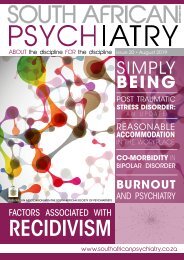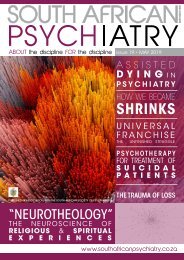South African Psychiatry - February 2019
South African Psychiatry - February 2019
South African Psychiatry - February 2019
You also want an ePaper? Increase the reach of your titles
YUMPU automatically turns print PDFs into web optimized ePapers that Google loves.
CULINARY CORNER<br />
A MEANINGFUL MEAL<br />
OF PSYCHIATRIC AND<br />
PSYCHOLOGICAL<br />
INFORMATION<br />
If you are interested in acrophobia, our menu<br />
today starts with a study regarding the most<br />
therapeutic way of dealing with a fear of heights.<br />
Then we go on to the medication used to help<br />
a patient tormented by ghostly insects; the use<br />
of mirror therapy in those tortured by phantom<br />
limb pain; and the influence of alexithymia on<br />
symptom over-reporting. The refresher comes from<br />
a study which explores the impact of social group<br />
membership on the recognition of creative work,<br />
and dessert provides an answer to the question as to<br />
whether the expressive arts can alleviate symptoms<br />
of trauma or not. Coffee is accompanied by a review<br />
study of optimism’s association with good physical<br />
health.<br />
STARTER<br />
USING VIRTUAL REALITY AS A<br />
THERAPEUTIC MEANS<br />
Do you often listen in awe as others<br />
boast about aeroplane or bungee<br />
jumping? It sounds magical - but<br />
also anxiety-provoking, particularly<br />
if standing on a second-floor<br />
balcony is about as high as you<br />
will go. It turns out there’s a good<br />
way of helping those of us with a<br />
fear of heights to get in touch with<br />
our adventurous selves. A group<br />
of researchers (Freeman et al, 2018) carried out a<br />
randomised trial of automated reality in the treatment<br />
of a fear of heights. They divided up one hundred<br />
acrophobic individuals into an experimental group<br />
(forty-nine members) and a control group (fifty-one<br />
participants). The members of the control group<br />
were linked to a virtual reality program (VR) and their<br />
levels of improvement were compared to those of<br />
the control group.<br />
PARTICIPANTS OF BOTH GROUPS WERE<br />
OLDER THAN EIGHTEEN YEARS AND<br />
SCORED MORE THAN 29 ON THE HEIGHTS<br />
INTERPRETATION QUESTIONNAIRE (HIQ).<br />
THIS QUESTIONNAIRE WAS CHOSEN<br />
BECAUSE IT HAS BEEN FOUND TO BE<br />
PREDICTIVE OF DISTRESS, ANXIETY,<br />
AND AVOIDANCE OF REAL HEIGHTS.<br />
FREEMAN ET AL (2018) NOTED THAT IT<br />
HAS HIGH INTERNAL CONSISTENCY AND<br />
CONVERGENT VALIDITY WITH OTHER<br />
FEAR OF HEIGHTS MEASURES.<br />
The experimental group interacted with a virtual<br />
coach in a virtual office. He started off by presenting<br />
ways of dealing with this fear from a cognitive<br />
perspective. Participants were then “taken” to the<br />
70 * SOUTH AFRICAN PSYCHIATRY ISSUE 18 <strong>2019</strong>
















